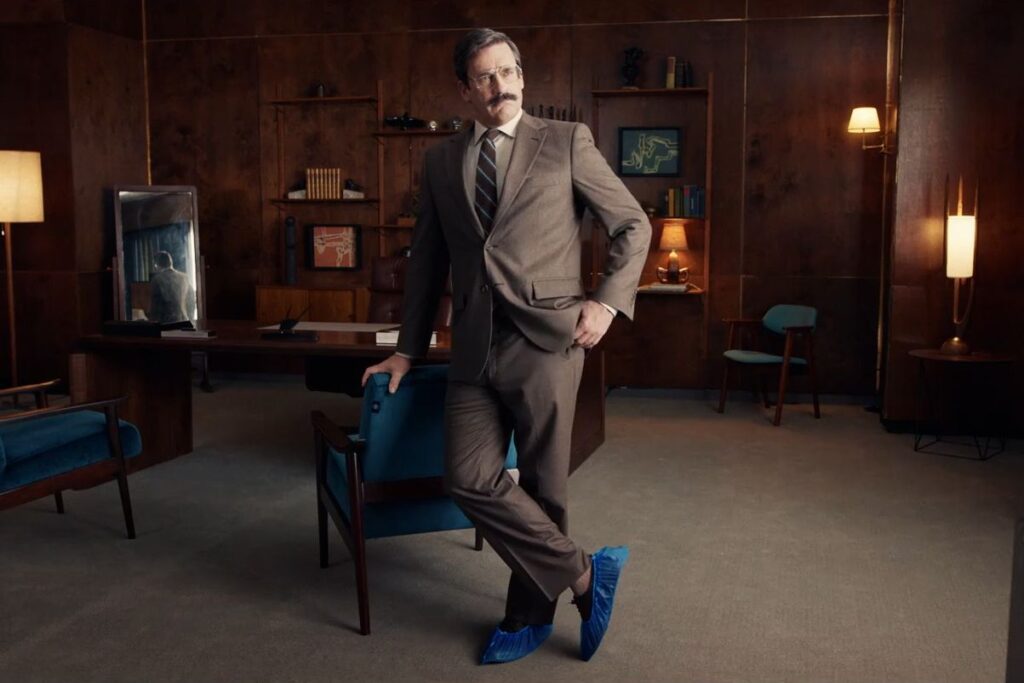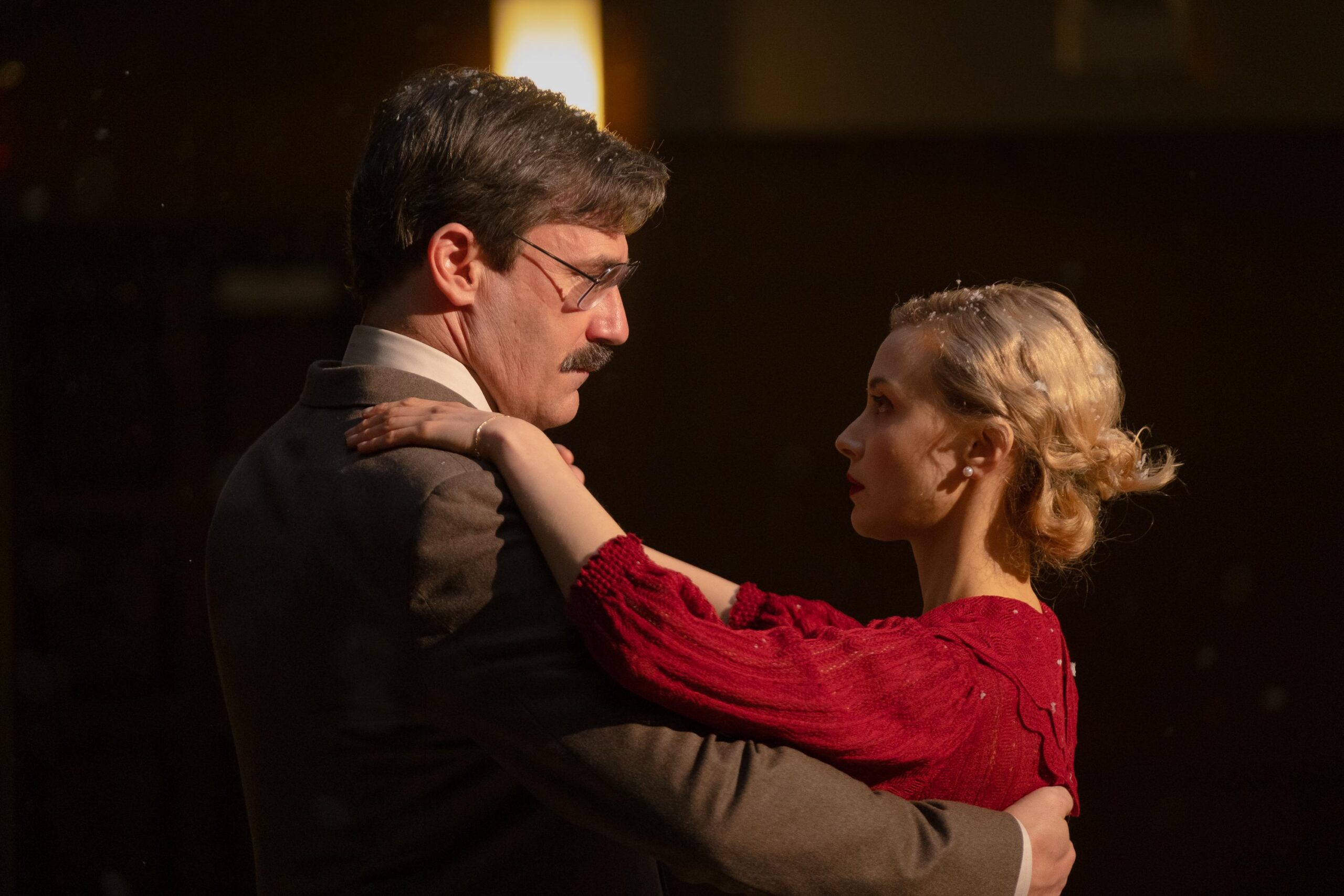Corner Office: Unveiling the Absurdity of Corporate Life. To say that “Corner Office” won’t be for everyone is perhaps the understatement of the year. This film takes a deep dive into the absurdity of corporate life, and it’s not a lighthearted journey. But, if you’re ready to embrace the quirkiness, it’s a dark comedy that might just leave you questioning the very foundations of the corporate world.
From here on out – we’ll be discussing the deep inner workings of the movie Corner Office – here be monsters. Do not keep reading if you have yet to watch this film.
Corner Office Movie Overview
At its core, the movie delves into the life of Orson, brought to life by the charismatic Jon Hamm. Orson is a man meticulously navigating the corporate maze, where power struggles, backroom deals, and moral compromises are the order of the day. He enters “The Authority Inc.,” a sprawling bureaucratic organization where the appearance of comfort often disguises extreme discomfort. (So similar in look and feel to Apple TV’s show Severance, that it’s a bit uncomfortable.)
Orson’s meticulous nature sets him apart. He notices every nuance in his surroundings, from the dynamics of office politics to the peculiar requirement that employees must wear blue plastic booties to protect the floors. This seemingly small detail holds a deeper metaphor, emphasizing the need to value one’s role within the corporate structure. Or worse, that the employees themselves are less important than… the floors.
Yet, Orson’s journey takes a peculiar twist when he stumbles upon “the Room.” This mysterious space becomes his sanctuary, a place where he can find solace and reflect. At first, he’s drawn to it, but its unconventional nature raises questions about its existence. Is it real, or is it a product of Orson’s mind?
As Orson becomes increasingly obsessed with the Room, his colleagues grow concerned. They question his sanity, suggesting that the Room might be nothing more than a figment of his imagination. Orson, unwavering, invites them into this enigmatic space, attempting to prove its existence. It would seem as though, while Orson is, “in the Room”, he is actually just standing in the hallway and staring into the distance? Could he just be flipping insane? The team even go so far as to suggest Orson has lost his marbles. Knowing what he KNOWS, Orson is faced with a dilemma: is he truly on the verge of a breakdown, or is he the only one who sees the corporate facade for what it is?
Corner Office’s goal from minute one, is to weave a narrative tale that will keep the viewer questioning reality. Is Orson’s reality a reflection of corporate absurdity, or is he descending into madness? As viewers, we are left to ponder the thin line between conformity and rebellion, making us question our own roles in the corporate machine. The strictures of corporate life, many arbitrary, are they there so make things more clear, or to encumber arbitrarily? There are a ton of metaphors that Corner Office is making… or could be making? Is it that intentional?
Throughout the film, director Joachim Back masterfully conveys the stifling, antiseptic atmosphere of Orson’s workplace. The sterile environment, characterized by uniformity and precision, is a stark contrast to the Room’s warmth and individuality. It’s a visual representation of Orson’s internal conflict, the desire to break free from the corporate constraints. And we also have to give props to Jon Hamm’s performance, which is nothing short of brilliant, capturing Orson’s descent into a world that might be of his own creation. The film navigates the surreal and absurd, akin to works by Kafka and Beckett, leaving us to question the fine line between brilliance and madness.

A Deeper Dive Into The Ending of “Corner Office”
Maybe it might help if we drop in a few details from the book The Room, that the movie is based on? Shall we? Upon finishing the movie, I immediately found the book and quickly gargled it down. One of the biggest details that we miss from the movie, that we get in the book, is the reason that our intrepid hero left his previous job. We learn that while Orson choose to leave, it was clear that his boss convinced him that he would be able to excel somewhere else. That his current job was holding him back. But it was really obvious that he was being fired because he just wasn’t liked by any of his work mates. Orson thought himself smarter. Orson believed himself to be God’s gift to the workplace… and this is not an insignificant detail to leave out.
We already know that Orson knows he knows the best way to do things, and he feels that once he gets his footing at the new office he will be able to correct all the mistakes and errors that litter his new work environment. But before he is able to turn that corner, he finds the Room.
Orson then begins working on the files in the Room, and the work really impresses them. Everyone. These files are different. These files are special in some way. But Orson, in order to not be caught loitering in the hallway, has to do all his work after hours.
And in both the book, and also the movie, they escalate the question. They escalate it all the way to the VP in order to see what he decides. And the VP, which we never meet, tells them that the Room does not exist and that Orson actually cannot utilize it. Worse, Orson is even asked to leave the company. Orson runs and finds his way to the Room where he feels safe and secure. Even in spite of their incessant knocking. Problem? We actually see that he is just standing there in the hallway. But for Orson? He is happily sequestered, safe and secure in his inner sanctum.
But What Do We Make of the Receptionist?
The only stand out character throughout the film and the book, other than Orson, is the receptionist. In both the film and the book it’s easy to see that Orson likes her. In the book, Orson chats with her at the Christmas party then he whisks her away to the Room. We learn that he believes that they are in the Room for something like an hour. But it’s weird that he isn’t quite sure what happened while there. He says they kissed, but when she looks at him afterwards, she looks at him in a funny way. No?
Later, she is put off by him. Hrm. Weird. The receptionist asks him if he is on drugs. Hahaha. He definitely doesn’t understand how he is perceived by others. In the movie, this encounter in the Room happens much later, and is a much more pivotal moment to the meaning. He even tells her that it is the Room that is to be credited with his impressive work on the files. She wants to understand more, so he takes her there. But she doesn’t see it. Though she really wants to. Putting her hand on the doorknob, he tells her to open the door. Upon entering, she tells him how great he is, and he is amazed how seen he feels. They dance, and then, they exit the Room……… only for her to look at him weirdly again. See?
Final Thoughts on Corner Office
Still confused? I cannot help you. But I think it’s pretty clearly explained that Orson is mentally myopic, selfish, and self-important. He thinks he is the savior within this chaotically Kafke-esque environment. He believes himself to even be something of a Christ savior of sorts. And while the movie is a bit ambiguous, we get most of the answers that we need to understand that while Orson is in fact trapped in a maze, he is also delusional. We actually can’t even know how much of this world is even real, given that he is such an unreliable narrator.
Ultimately, Corner Office invites you to decide for yourself—is Orson’s Room a sanctuary or a mirage? The ending, much like the corporate world it explores, remains open to interpretation, inviting you to explore the complex tapestry of the human mind and the relentless pursuit of personal freedom. Is he 404’ing after too much insanity of the normal modern office environment? Is he failing by thinking he alone knows the answers? Personally, I think we are seeing Orson playing the part of many insane corporate monsters who fail by thinking that they are alone the ones that know how to put everything to rights. And you know someone like that too I’m sure.
Edited by: CY

